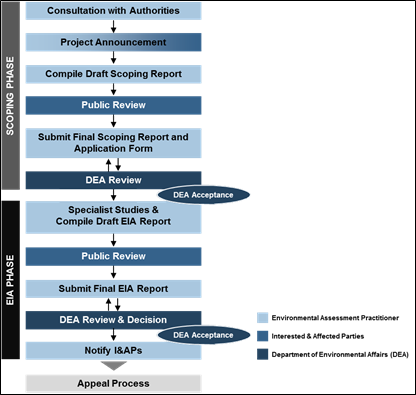|
The Mokolo and Crocodile River (West) Water Augmentation Project (MCWAP) Environmental Module was originally initiated at the end of 2008, under the Environmental Impact Assessment(EIA) Regulations of 2006.The status of each of the original MCWAP Applications is shown on the table below.
Status of the Mokolo and Crocodile River (West) Water Augmentation Project
|
MCWAP Component
|
Environmental Assessment Process
|
DEA Reference No.
|
Status
|
|
Phase 1
|
Scoping and EIA
|
12/12/20/1465
|
Environmental Authorisation issued on 03 December 2010.
|
|
Phase 2
|
Scoping and
EIA
|
12/12/20/1466
|
EIA Application withdrawn following Scoping Phase due to uncertainty
pertaining
to the water
requirements.
|
|
De-bottlenecking
|
Basic Assessment
|
12/12/20/1467
|
Environmental Authorisation issued on 24 February 2010.
|
The Mokolo and Crocodile River (West): Water Augmentation Project Phase 2A (MCWAP-2A) was, however, resuscitated for the following reasons:
- Government identified and approved eighteen (18) Strategic Integrated Projects (SIPs) across the Republic of South Africa (RSA) to support economic development and to address service delivery in the poorest provinces. The SIP-1 entails the unlocking of the Northern Mineral Belt with Waterberg as the catalyst. Investment in rail, water and transmission infrastructure as well as power generation will catalyse unlocking rich mineral resources in Limpopo resulting in thousands of direct jobs across the areas covered. The MCWAP includes the water infrastructure needed for SIP-1. Due to the priority accorded by Government to such SIP projects, it was prudent to give priority to the future water needs of the Lephalale Area in support of the national development imperatives.
- The Mokolo and Crocodile River (West) Water Augmentation Project Phase1(MCWAP-1) augments the supply from Mokolo Dam, which is already operational since June-2015. It serves as an interim measure to supply in the growing water requirements of Lephalale, Eskom and Exxaro. The MCWAP-1 will utilise the full yield from Mokolo Dam optimally over the long-term. The sustainable yield of Mokolo Dam is, however, not sufficient to meet the increased needs of the users, including the pollution abatement measures, namely Flue Gas Desulphurisation (FGD), which is an environmental and funding condition for the Medupi Power Station.
- A suitably sized transfer pipeline from the Crocodile River (West) can be implemented timeously to meet the increased requirements to support the RSA’s economy. The MCWAP-1 will be operated as a system together with proposed MCWAP-2A when the latter is completed (if authorised). The MCWAP-2A will also provide the necessary assurance of water supply to the strategic end users from independent sources.
- The water requirements have been finalised to the degree that is adequate to take informed economic decisions with respect to the transfer capacity of the MCWAP-2A.
Nemai Consulting was appointed by the Department of Water and Sanitation (DWS) and the Trans Caledon Tunnel Authority (TCTA), who is the Implementing Agent, to undertake the EIAs for the following components of the proposed MCWAP-2A, in terms of Government Notice No. R. 982 of 04 December 2014 (as amended):
- Water Transfer Infrastructure: Application for a Scoping and EIA Process to the Department of Environmental Affairs (DEA), and
- Borrow Pits: Application for a Scoping and EIA Process to the Department of Mineral Resources (DMR).
In addition, approval will also be sought from the DWS for water uses associated with the MCWAP-2A in terms of Section 21 of the National Water Act (Act No. 36 of 1998).
The EIA Process for the MCWAP-2A: Water Transfer Infrastructure is outlined below.

|